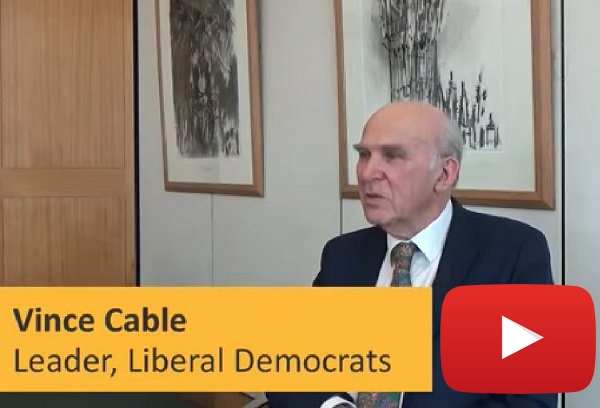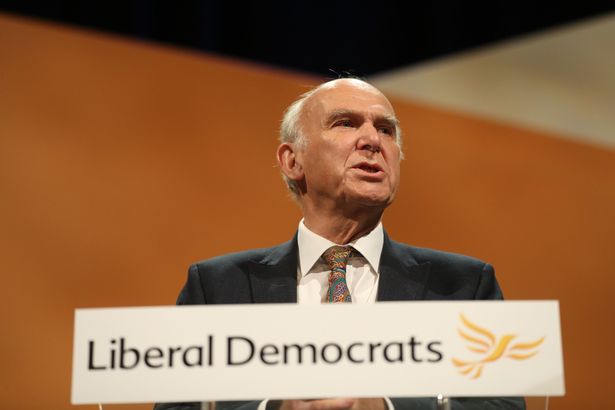Main author
Michael BrooksVince Cable interview
At the start of 2018, the Liberal Democrats published research showing that, despite the housing crisis and rising homelessness, there are more than 216,000 homes across England and Wales that have been left empty for six months or more. The research also highlighted that the fact that more than 11,000 houses have been left empty for at least 10 years.
On 15th February 2018, Michael Brooks, Editor at Designing Buildings Wiki, interviewed the Leader of the Liberal Democrats, Sir Vince Cable MP, about the research findings, the wider housing crisis, overseas speculators, Help to Buy, the collapse of Carillion, and more...
Watch the interview video on our Youtube channel.

|
Contents |
[edit] New research
|
Michael Brooks (MB): At the start of 2018, the Liberal Democrats released new research showing that 11,000 homes across the country have been empty for 10 years or more. What prompted this research? |
Vince Cable (VC):
What prompted it was a worry about the lack of housing and the appalling problems now facing young families trying to get into the housing market, and all those in the private rented sector faced with unaffordable rents. There is a housing crisis and the market is dysfunctional in all kinds of ways.
One of the problems is that while we have acute scarcity of property, there is a large amount of property that is under-occupied or unoccupied. We found 11,000 homes left empty for 10 years, and there's hundreds of thousands left empty for shorter periods of time.
In some cases there are good reasons for it, but in other cases this is property that is never going to be brought into circulation unless someone does something about it. There is legislation enabling local authorities to acquire empty property, renovate it and let it. What we discovered was that very few councils are using the powers that they are entitled to use. We want this to change, we want to have an obligation on local authorities to demonstrate how they're going to use their stock of empty homes.
|
MB: The research found that very few local councils are using the available powers to requisition properties left empty for at least 6 months. What should government be doing to change this situation? |
VC:
It may be there needs to be some revision through secondary legislation in how orders are applied, they do seem to be rather legalistic and bureaucratic, so it may require a smoother, sharper process to enable this to happen.
[edit] Housing market
|
MB: Considering your findings, and the fact that over 400 luxury towers are in London's development pipeline despite a slump in sales last year, do you think the housing market is currently working for people on the whole? |
VC:
No, it isn't, but the question is how you get at that problem in a practical way. There is a council tax surcharge on empty property or second homes, but it could be much more penal and create a real disincentive - if you had 300% council tax or even more, you could potentially shift a certain amount of this luxury accommodation.
Price incentives only work to some extent because some of those people's money is here for questionable reasons, or they just see Britain as a safe haven from political risk back home so a bit of extra tax won't deter them, but if it was tough then you would get some of that property moved on.
[edit] Empty housing is at its lowest level
|
MB: The Mayor's Homes for Londoners report indicates that the number of empty homes in London is actually at its lowest level since the 1970s, at 0.6%. While it may be symbolic of inequality in the housing market, is it actually that big a deal? |
VC:
Well, it's part of a much bigger picture. It's not surprising given the enormous pressure on the housing stock that such empty property is being better used, but there's still a lot of it and we've got to deal with it.
It's very much second in priority to getting a lot more houses built, and houses that are affordable for people on roughly average incomes, that's the big gap at the moment, as well as the lack of social housing for those who aren't going to be able to afford to rent or buy commercially.
[edit] Overseas speculators
|
MB: The argument is often made that the problem is purely one of supply and demand. Would you agree, or does that ignore the impact on property values of unrestricted investment from overseas speculators? |
VC:
It's not solely a matter of under-supply. We do have a supply and demand problem, we do have a shortage of supply relative to what's needed to keep the market stable in the long run. Most of the estimates are between 250-300,000 a year, let's say 270,000-275,000. In recent years, we've been building half that. The last few years have seen something of a boom in house-building, but it's well short of that level.
I was first active in politics in Glasgow in the late-60s/early-70s, and we were getting 400,000 houses a year built. Many many more than today for a smaller population. There were particular reasons to do with slum clearance and wartime damage, but even so, we're currently way below our construction potential.
It does ignore the impact of foreign investment, yes. It's difficult sometimes to pick out people's motives. Britain should be open to foreign investment, as a general proposition I'm broadly in favour of that, and some of the overseas investment of housing is genuinely adding to the stock in a welcome way. But there's undoubtedly been, particularly in London but not exclusively, house-building and luxury accommodation largely for people to hold it as a store of value and not to be lived in. That is clearly unacceptable because the land could otherwise be used for proper housing.
There is an issue about planning permission in the first place - local councils being clear what the housing is for, making sure there is a commitment to house local people. Local authorities could be clearer about what they are trying to achieve. But you also need penalties, if property isn't utilised there should be a tax on it, and we are advocating a 300% council tax.
Of course, that isn't just on luxury housing in London, but there are some rural areas - the Lake District, Cornwall, Wales - where there is enormous anger about property that is purely held for investment purposes and used once or twice a year. That's where the council tax impact could be significant.
[edit] Inflated land values
|
MB: Do you think the coalition government's policy of quantitative easing fuelled the influx of capital to London's property market and perhaps led to such inflation of the land values? |
VC:
It probably did, I would nonetheless defend the policy. We have to remember the context, it was a position where the banks were broken, they'd been badly damaged by the financial crisis, they were not lending, that was one problem. In addition, the government had very large deficits and debts, so the traditional Keynesian policies which you would normally use in those conditions couldn't apply, so the central banks had to use very aggressive monetary policy.
It wasn't just the coalition government, it was done in the US, still is operating in the eurozone and Japan, and has had the effect of staving off the most appalling recession. We did get a downturn but nothing like as bad as in post-crash America in 1929. Monetary policy has been used to keep economies going, it has largely succeeded in doing that, but one of the side effects is that some of the liquidity has been pumped into the housing market and other assets, equities, and the housing market is overpriced as a result.
[edit] Help to Buy
|
MB: There is some evidence that house prices are driven by affordability rather than just supply and demand. Do you think that initiatives like Help to Buy actually make the situation worse? |
VC:
Yes, I think Help to Buy was an absolutely terrible idea. You're quite right, supply and demand matters, but if you're looking at any one particular point in time, the annual increment to supply through building is less than 1% of the market, so what is much more important is affordability and access to credit.
If you have very loose lending, which is what we had in the run up to the financial crisis, the market gets out of control, as indeed happened. And that's beginning to happen again and its made much much worse by Help to Buy. All the research I've seen shows that it's bid up prices and actually forced more people out of the market than were brought into it as a result of access to their subsidy. I've argued very strongly privately and publicly in government that this was a terrible idea, and nothing since has happened to make me think I was wrong.
[edit] Carillion
|
MB: In light of recent events regarding Carillion, do you think there was enough concern raised about relying too heavily on big firms such as those? |
VC:
Well, in retrospect it's clear that government was relying too heavily. It's fair to say that until quite close to the death of Carillion, no one was going around systemically warning about this. We had spotted, after July 2017, that there was a serious issue with this particular company and their profit warnings, and we were urging government to start looking at it seriously at that point.
The bigger question about whether Britain has become overdependent on a handful of mega companies, in some cases with rather questionable business models - paying out large dividends when their pension funds were being under-funded - that wasn't picked up and it should have been.
One of the lessons we've learned from it is, firstly, government procurement and oversight of contracts has got to be a lot smarter; that means training civil servants at a higher level to do these things properly, and also it means ensuring that when you have government procurement for big building contracts that we're willing to entertain a larger number of suppliers - Tier 1, SMEs - giving them direct access to contracts rather than necessarily working through one big company.
[edit] Developers
|
MB: Developers take a lot of blame for the housing crisis, but they generally operate on low margins, and regularly go bankrupt. Isn’t the reality that successive governments have accepted increasing tax revenues from a growing population, but have done nothing to accommodate the extra people? |
VC:
Many of us now accept that the basic model is flawed, but its been convenient for successive governments to go along with it. The truth is that housing development will only happen in an environment where you have rising prices which are creating a better margin for the developers.
We know that a large amount of land is left unoccupied, people sitting on landbanks because its improving their balance sheets if prices go up in the meantime, this is not a good model for maximising the number of houses being built of adequate quality. So we do have to change the model. That probably does mean intelligent forms of state intervention - local councils having greater freedom to borrow to build, the council housing stock has depleted too far, stopping the Right to Buy which has done terrible damage at the bottom end of the market.
It also means government reverting perhaps to the 'new town model', active development, acquiring land cheaply within garden city or village-type structures. It could be done through development corporations or local councils, probably the former, but we do need a different model. Simply relying on a handful of house-building companies who, let's not forget, are acting in a completely rational way within the model, but it does mean undersupply.
[edit] Public sector house-building
|
MB: There is a Liberal Democrat policy to force house-building on public sector land. How would that work in practice? |
VC:
Well, not just public land. One of the points that's now become part of the debate is, the compulsory purchase rules which were devised around 1959-60, simply don't allow for development agencies or councils to acquire land without hope value in the way that is necessary in order to provide adequate supply.
In addition, there is undoubtedly the case that councils, and for that matter the health service, are sitting on vast amounts of land; it isn't just private developers who have land banks - councils and public authorities do too. There's got to be very strong pressure from central government. A good example is the Ministry of Defence; there's no penalty on them for holding excess land and the Treasury should be penalising that not incentivising it.
[edit] Building on the Green Belt
|
MB: You've been out-spoken about your support for building on the Green Belt in the past...? |
VC:
Yes, I think the Green Belt has become something of a religion. The concept is a very good one, the idea of it is something we must fight to preserve, but it is often done in a very mechanical, dogmatic way. There's some land that has low amenity and there's bits of brownfield that should be protected. So, better flexibility at the margin is important.
When we talk about green land, it's often couched in terms of protecting farmland, but actually what are really under threat at the moment are parks and playing fields in urban areas, that's where the fight should be.
Watch the video of the interview here.
[edit] Find out more
[edit] Related articles on Designing Buildings Wiki
Featured articles and news
A case study and a warning to would-be developers
Creating four dwellings... after half a century of doing this job, why, oh why, is it so difficult?
Reform of the fire engineering profession
Fire Engineers Advisory Panel: Authoritative Statement, reactions and next steps.
Restoration and renewal of the Palace of Westminster
A complex project of cultural significance from full decant to EMI, opportunities and a potential a way forward.
Apprenticeships and the responsibility we share
Perspectives from the CIOB President as National Apprentice Week comes to a close.
The first line of defence against rain, wind and snow.
Building Safety recap January, 2026
What we missed at the end of last year, and at the start of this...
National Apprenticeship Week 2026, 9-15 Feb
Shining a light on the positive impacts for businesses, their apprentices and the wider economy alike.
Applications and benefits of acoustic flooring
From commercial to retail.
From solid to sprung and ribbed to raised.
Strengthening industry collaboration in Hong Kong
Hong Kong Institute of Construction and The Chartered Institute of Building sign Memorandum of Understanding.
A detailed description from the experts at Cornish Lime.
IHBC planning for growth with corporate plan development
Grow with the Institute by volunteering and CP25 consultation.
Connecting ambition and action for designers and specifiers.
Electrical skills gap deepens as apprenticeship starts fall despite surging demand says ECA.
Built environment bodies deepen joint action on EDI
B.E.Inclusive initiative agree next phase of joint equity, diversity and inclusion (EDI) action plan.
Recognising culture as key to sustainable economic growth
Creative UK Provocation paper: Culture as Growth Infrastructure.




























